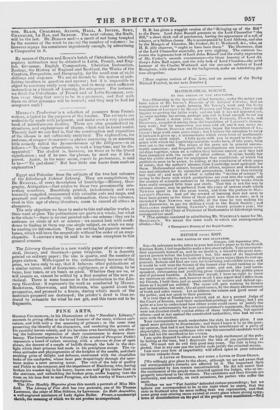MATHEMATICAL SCIENCE.
TO THE EDITOR OF THE SPECTATOR.
SIR—Observing in the Spectator of last Saturday, under the notice you have taken of Mr. YOUNG'S Elements of the Inlvv.al Calculus, that no comparison could be made between Mr. YOUNG'S work and the hasty translation of LACROIX'S by Messrs. PEACOCK and WHEWELL, I have made inquiry respecting the latter work, and am told it has not appeared yet. As some mistake 'has arisen, perhaps you will be kind enough to set one right.* About a dozen years since, Messrs. 13AnnAcE, PEACOCK, and H ERSCHEL, completed among them the translation of LAcaoix's elemen- tary work ; but the impression was soon sold off, and it was never re- printed. Messrs. PEACOCK and HERSCHEL began the translation of LA- caoix's large work some years since ; but I believe the intention to carry it forward is given up ; a circumstance which every lover of mathemati- cal science must regret. I fully agree with you in regard to the negli- gence with which the Cambridge scientific works have, of late years, been sent out to the world. The errors of the press are in general uncom- monly numerous ; and frequently the investigations are erroneous seve- ral steps together, when on a sudden they become correct, as if they had been compared with the results of other authors. It seems hardly fair that the public should pay for negligence thus manifested; of which the publishers seem to be aware, by adding, at the conclusion of whole pages of errata, that the author's absence from Cambridge must apologize for them. Mathematical science, beyond all others, requires and demands a care and attention for its successful prosecution, which is thus entirely lost sight of ; and much of what is called the "decline of science" is owing to the haste with which productions are sent into the world, and the anxiety of scientific authors to be thought eminent by works which have really occupied little time and study. That this is not the way to advance science, may be gathered from the years of intense study which NEWTON spent in his two great works, and from the preface to MAC- LAURIN'S Fluxions. And yet the reward of learning does not seem to have been greater in the times of these great men than in ours ; as it is recorded f that NEWTON was unable, at the time he was making his great discoveries, to pay his shilling a week to the Royal Society ; and MACLAURIN received during NEWTON'S life twenty pounds a year; the emoluments of the Chair of Professor of Mathematics at Edinburgh being considered too small. [The mistake consisted in substitutino. Mr. WHEWELL'S name for Mr. 1-1Eitscaeils. We meant the same work to which our correspondent alludes.—En.3 -t Thompson's History of the Royal Society.


























 Previous page
Previous page